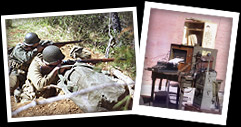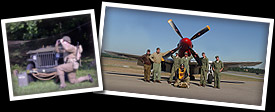Excerpts from
Combat Lessons
These "Combat Lessons" were printed by the War Department during 1944 as a way to quickly disseminate knowledge learned by troops in combat. I've got .pdf files of Number 1 - 8. I do not know how many more of them were printed.
Below will be lessons learned that will be applicable to reenactors & living historians in the field. I've only gotten thru Combat Lessons #3, so I'll continue to add to this in the future.
Combat Lessons Number 1
Team Up! Capain William T. Gordon, Infantry, Sicily: "I have found that men in position must fight in pairs; an order that 50 per cent stay awake is thus easily enforced; it bolsters morale and nerves.
Rally Point "In every company attack order a reserve force must be prescribed; I always do even though sometimes this force consists of myself and my First Sergeant. Often a soldier who a moment before has run away is converted into a fighter by leadership. A reserve force gives him a rallying point."
Small Arms Against Armor Captain Jarrold, Infantry: "We found that caliber .30 AP pierces enemy armored half-tracks at close ranges."
Buddy System Lieutenant Colonel William O. Darby, commanding Officer of Rangers, Italy: "In our work we use the 'Buddy' system--the men always work in pairs. They live in pairs, eat in pairs, do guard in pairs--even do KP in pairs. Confidence in each other is developed. They can pick their own buddy from within the platoon.
Recognition "We use colored flashlights with the light dimmed down for recognition purposes in night work. Different colors are used, and we usually have a certain light signal for recognition; for instance, 'A' -- which would be a dot, dash. It gives a man great comfort and confidence when working at night, especially in towns, to receive a recognition signal when he needs one.
Formations "We use a column formation for approach and assault movement at night. From experience, I believe it is the best formation to use at night. We do not attempt to use prominent terrain features to keep direction. We use pacing, compass bearing, and stars. Usually in advancing to attack at nigth we halt to check position every 1,000 yards. We start moving again by radio signal over the SCR 536 (A 5 1/2 pound "Handy-talkie" transmitter-receiver) or by runner. "
"It is necessary to arrange for collecting your men together again after the raid is over. To do this I have men stationed along a line through which men will pass at intervals in their withdrawal. The sentinels on this line stop and collect the men into groups as they withdraw."
Cooking I prefer to have men cook their own meals with their mess kits. We do not have kitchens in Sicily, and we have been here a month without them. Even though the kitchens are available I always have men individually cook at least one meal a day.
Combat Lessons 3
How I Would Train a Company Now Captain Robert C. Gates, Infantry, Italy: "If I had to train a rifle company again, I would stress the following:
"Basic discipline, by which I mean smart saluting, alertness of bearing, cleanliness and neatness of person, clothing and equipment--shoes shined, hair cut, etc. Get perfection in this early, as it is the basic of much later training.
"Combat firing on a course which included a lot of surprise targets. Proper distribution of small arms fire over a suspected targe area is very important.
"Use of the rifle sling, particulary in combat firing. Most men fail to use it even when in a defensive or other situation where its use is perfectly practicable. Practice until the use of the sling is so natural that a man must consciously decide not to use it when the situation is such that it's use is inappropriate.
"Sniper training for the upper 20 percent qualified in marksmanship in each rifle platoon. Organize at least two 3-man sniper teams in each platoon. Allowing for casualties and sickness you could count on having about two 2-man teams in each platoon in combat. A sniper's rifle and a pair of binoculars per team is essential.
"BAR training to be given to every man in the squad until he has a thorough knowledge of the weapon. It is one of our more effective weapons but must be in the hands of a trained man to be really valuable. A BAR man in one of our companies got twenty Germans 'for sure' in one hour during one of their counterattacks; this was one-half the casualties his platoon inflicted.
"Scouting and patrolling needs plenty of emphasis. My company landed in Sicily with about 7 noncommissioned officers and 25 privates really efficient in this. As a result they were worked to death. There numbers became reduced and the replacements that we received knew little about the subject. Therefore our patrolling grew progressively weaker as the campaign went on. This training should include passage of mine fields, compass work and map reading, and patrolling against actual enemy groups.
"Terrain appreciation, to teach the men advantages and disadvantages of terrain features. Teach them to visualize how the ground on which you are located looks from the enemy's viewpoint, i.e., what he can see and what he can't see; where you can take position unobserved, eetc.
"Camouflage and camouflage discipline, particularly the discipline. Pound into the ment the necessity of not making trails, not moving around when the enemy can observe your position, and similar matters, until each man always thinks about it.
"Organization of the squad chain of leadership to the point where if only two men are left in the squad they will know automatically which one is the leader. Keep the squad organized this way regardless of casualties and consequent replacements.
"The weapons platoon should be worked into the company team to a point where the company commander habitually uses it to its utmost capacity. Too often the 81-mm mortars and the artillery are called on to accomplish work that could be handled by the weapons platoon.
"Living in the field under adverse circumstances should be taught. This means that the men should know how to put a shelter half over a fox hole or slit trench, leaving a small hole through which to observe and to fire. They should know that they must remove the shelter half and recamouflage the trench or hole whenever the weather clears. They should also be trained to remove their shoes and socks each day and massage their feet. Such training will really pay dividends.
"Messengers should receive specialized training in scouting and patrolling. Make them practice and practice until they can repeat a simple verbal message exactly as it was given to them. Do not permit them the slightest deviation from the wording of the message. Also these men should receive intelligence training, as frequently they have opportunities to see and report things of value to the commander. All messengers in my regiment have been sent to an intelligence school and it has helped.
"In selecting noncommissioned officers, I am convinced that steadiness is the first asset, resourcefulness is the second, and intellect only third."
Comat Existence Brigadier General William H. Wilbur, 36th Division, Italy: "First, the soldier must know how to live at night. A squad should sleep as a squad so that the squad leader can get hold of his men quickly. Also, platoon chiefs must be able to get hold of suqad leaders, and so on. A company commander of one of our infantry divisions who saw our battle training course said that if his men had had it he might have been able to save more of his company in a certain situation when they were jumped at night. As it was, it took nearly 2 hours to assemble his company.
Cooking, Digging, Marching "Similarly, men must know how to cook at night, how to organize a defensive position so as to be able to receive a counterattack in daylight--including such a simple thing as how to dig a foxhole at night.
"Physical conditioning, too, is all important. Here in the so-called rest period all infantrymen take a 4-mile march in 40 minutes each day. Precision and snap in all basic drill, including calisthentics, should be stressed."
Blend With Your Background Brigadier General William H. Wilbur, Assistant Division Commander, Italy: "Interrogation of German prisoners disclosed that they all agreed that Americans moving over the terrain were easy to spot. This was particularly true whenever there was a group of more than four or five men and especially when these men made no attempt to change their appearance. Several prisoners told me that our 'yellow brown' uniforms, as they termed them, were very easy to pick up against the gray, rocky, mountain background as well as against the green field background of Italy.
"Find That Keg" Lieutenant Colonel J. W. Wells, Field Artillery Observation Battalion, Italy: "In moving into position, we have never been able to move the battalion as a unit; we always bring it up in small increments. Therefore it is important that everyone who might have occasion to guide these small elements be well versed in map reading, in following a route at night, and in following a compass at night. During one training period we had 'keg of beer parties'. A keg of beer would be set out in a spot which was relatively difficult of access. The men would be given only a compass azimuth. Those who got there first, got the beer."
Common Violations of Radio Security Brigadier General Richard B. Moran, Chief Signal Officer, Fifth Army, Italy: "Use of proper names, Christian names, nicknames, etc. to refer to an officer or enlisted man defeats the object of daily changing code signs and helps to identify groups. The authorized code or codex must be used.
"Use of unauthorized code names or codewords may cause confusion. Units may not allot them without permission.
"Long transmissions give the enemy plenty of time to tune in and increases his chances of gleaning information. Keep 'off the air' if possible. Keep transmissions short.
"An encoded map reference must not be accompanied by a description of the place referred to.
"Administrative reports must not be sent in the clear. The enemy can often obtain valuable information from them.
"Codex is more secure than the reference-point code and its use should be encouraged."
Disclosed by Your Code Official Report, Signal Operations, Sicily: "The continued use by an organization of a code of their own making will easily identify that unit wherever and whenever it moves. Members of a unit captured by the enemy disclose the unit designation. As long as the unit uses its special-type code its identification is certain."
A Reel Convenience Major Pickett, Signal Officer, 1st Infantry Division, Italy: "When we lay wire over here we leave the empty reel at the end of each mile looping the wire around the reel a couple times. This not only clears the truck but also provides a reel when the wire is picked up by ourselves or some other unit."


